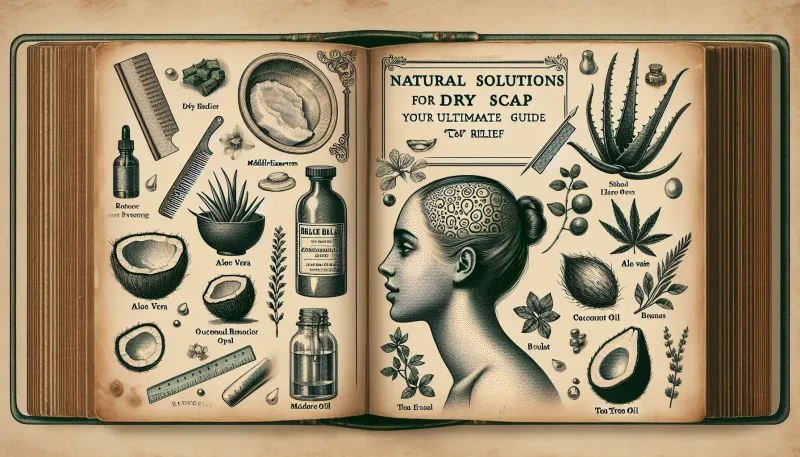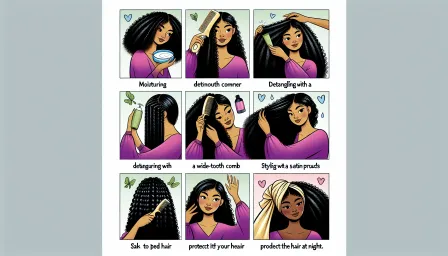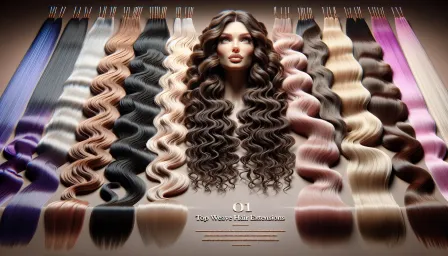Natural Solutions for Dry Scalp: Your Ultimate Guide to Relief

Discover effective natural solutions for dry scalp. This comprehensive guide offers tips and remedies to provide relief and improve scalp health.
Dealing with a dry scalp can be an irritating and persistent issue. Itching, flaking, and discomfort often accompany this condition, leading many to seek effective remedies. Fortunately, natural solutions exist for those struggling with a dry scalp. This guide will explore the causes of a dry scalp and present various natural methods to help alleviate this troublesome problem.
Understanding Dry Scalp
What Causes Dry Scalp?
A dry scalp can result from several factors, including environmental conditions, skin disorders, and lifestyle choices. Some common causes include:
- Cold Weather: Low temperatures and reduced humidity levels can strip moisture from the scalp, leading to dryness.
- Harsh Hair Products: Shampoos and conditioners containing sulfates and alcohol can dry out the scalp.
- Poor Diet: Lack of essential nutrients, such as omega-3 fatty acids and vitamins A and E, can affect scalp health.
- Skin Conditions: Conditions like psoriasis and eczema often cause dry, flaky skin on the scalp.
- Improper Hair Care: Over-washing or using excessive heat styling can damage the scalp and strip it of natural oils.
Symptoms of Dry Scalp
Typical symptoms of a dry scalp include:
- Itching and irritation
- Flaking and dandruff
- Redness and inflammation
- Sensitivity and tightness
Natural Solutions for Dry Scalp
There are numerous natural remedies that can help alleviate dry scalp symptoms and improve overall scalp health. Below, we'll explore some of the most effective solutions:
Aloe Vera
Aloe vera is renowned for its soothing and moisturizing properties. Applying aloe vera gel directly to the scalp can provide relief from dryness and reduce inflammation.
How to Use:
Apply fresh aloe vera gel to the scalp and let it sit for 20-30 minutes before rinsing with lukewarm water. Repeat this process 2-3 times a week for optimal results.
Coconut Oil
Coconut oil is an excellent natural moisturizer that helps to nourish and hydrate the scalp. Its antifungal properties can also help manage dandruff.
How to Use:
Warm a small amount of coconut oil and massage it into the scalp. Leave it on for at least 30 minutes, or overnight, before washing your hair with a mild shampoo.
Tea Tree Oil
Tea tree oil has powerful antimicrobial and anti-inflammatory properties that can help reduce scalp irritation and dandruff.
How to Use:
Mix a few drops of tea tree oil with a carrier oil, such as olive or coconut oil. Massage the mixture into the scalp and leave it on for 15-20 minutes before washing it out.
Apple Cider Vinegar
Apple cider vinegar helps balance the scalp's pH levels, reducing dryness and flakiness. It also has antifungal properties that can combat dandruff.
How to Use:
Mix equal parts of apple cider vinegar and water, then apply the solution to the scalp using a spray bottle. Leave it on for 15 minutes before rinsing thoroughly with water.
Honey
Honey is a natural humectant, meaning it attracts moisture and helps retain it. Its antibacterial properties can also promote a healthier scalp.
How to Use:
Mix raw honey with water to form a paste and apply it to the scalp. Leave it on for 20-30 minutes before rinsing with warm water.
Omega-3 Fatty Acids
Incorporating omega-3 fatty acids into your diet can improve scalp health from within. These nutrients help maintain the scalp's natural moisture balance and reduce inflammation.
Sources:
Include foods rich in omega-3s, such as fatty fish (salmon, mackerel), chia seeds, flaxseeds, and walnuts, in your diet.
Tips for Maintaining a Healthy Scalp
In addition to using natural remedies, it's important to adopt healthy habits to maintain scalp moisture and overall health:
- Hydrate: Drink plenty of water throughout the day to keep your body and scalp hydrated.
- Balanced Diet: Eat a balanced diet rich in vitamins, minerals, and healthy fats to support scalp health.
- Avoid Over-Washing: Washing your hair too frequently can strip the scalp of natural oils. Aim to wash your hair 2-3 times a week with a mild shampoo.
- Use Gentle Products: Choose hair care products that are sulfate-free and contain natural ingredients.
- Protect Your Scalp: Wear a hat or use a UV protectant spray when exposed to the sun for extended periods.
- Reduce Heat Styling: Limit the use of heat styling tools and always apply a heat protectant before styling.
Conclusion
Dealing with a dry scalp can be challenging, but incorporating natural remedies and healthy hair care practices can provide much-needed relief. From aloe vera and coconut oil to dietary changes, there are numerous ways to naturally combat dry scalp and improve overall scalp health. Adopting these methods can result in a healthier, more comfortable scalp, free from the annoyances of dryness and irritation.
Remember, consistency is key, and it's important to find a routine that works best for your individual needs. With dedication and the right approach, you can achieve a hydrated and balanced scalp.



























